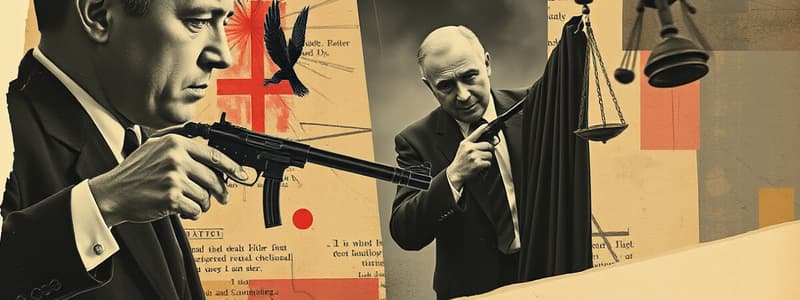Podcast
Questions and Answers
What is the legal principle that holds a person responsible for an offence even if they did not commit the act itself?
What is the legal principle that holds a person responsible for an offence even if they did not commit the act itself?
- Principal Responsibility
- Concursus Delinquentium (correct)
- Common Design
- Independent Liability
Accomplices are punished differently than the principal criminal regardless of their level of participation.
Accomplices are punished differently than the principal criminal regardless of their level of participation.
False (B)
What does Article 43 state regarding accomplices?
What does Article 43 state regarding accomplices?
Accomplices are liable to the same punishment as the principal.
Each party to an offence is liable to punishment in proportion to his individual _____ .
Each party to an offence is liable to punishment in proportion to his individual _____ .
Match the following terms with their definitions:
Match the following terms with their definitions:
In what case was common design confirmed as an essential element of complicity?
In what case was common design confirmed as an essential element of complicity?
The degree of guilt of individuals involved in a crime can vary based on the circumstances of the offence.
The degree of guilt of individuals involved in a crime can vary based on the circumstances of the offence.
What must an individual do to be considered to have concurred in an offence?
What must an individual do to be considered to have concurred in an offence?
What happens if someone decides to abandon a criminal plan before any steps towards committing the crime are taken?
What happens if someone decides to abandon a criminal plan before any steps towards committing the crime are taken?
If a principal offender decides to stop after beginning their actions that constitute an attempt, their accomplices are automatically exempt from liability.
If a principal offender decides to stop after beginning their actions that constitute an attempt, their accomplices are automatically exempt from liability.
What is Carrara's view on the liability of accomplices when the principal offender repents after an attempt?
What is Carrara's view on the liability of accomplices when the principal offender repents after an attempt?
If a man commands another to commit an offence but later changes his mind, he remains _____ if the change was not communicated in time.
If a man commands another to commit an offence but later changes his mind, he remains _____ if the change was not communicated in time.
In situations where the principal has attempted to commit a crime but later repents, what do some legal writers believe?
In situations where the principal has attempted to commit a crime but later repents, what do some legal writers believe?
Repentance of an accomplice before the commission of an offence absolves them from all responsibilities.
Repentance of an accomplice before the commission of an offence absolves them from all responsibilities.
According to the discussion of liability, what remains unchanged if the accomplice's change of mind isn't communicated in time?
According to the discussion of liability, what remains unchanged if the accomplice's change of mind isn't communicated in time?
Match the concepts related to desistance and complicity with their descriptions:
Match the concepts related to desistance and complicity with their descriptions:
Under what condition does the crime of conspiracy exist?
Under what condition does the crime of conspiracy exist?
The crime of conspiracy cannot be committed if the offenders voluntarily abandon their plan.
The crime of conspiracy cannot be committed if the offenders voluntarily abandon their plan.
What happens if the conspirators agree on a plan but it is subjected to a condition beyond their control?
What happens if the conspirators agree on a plan but it is subjected to a condition beyond their control?
The addition our law makes to the requirements of English law creates a heavier _________ of proof on the prosecution.
The addition our law makes to the requirements of English law creates a heavier _________ of proof on the prosecution.
What case confirmed that conspiracy is a formal offense regardless of the desired outcome?
What case confirmed that conspiracy is a formal offense regardless of the desired outcome?
Voluntary desistance can occur after conspiracy has been established without legal implications.
Voluntary desistance can occur after conspiracy has been established without legal implications.
What constitutes the commencement of a substantive offense in the context of conspiracy?
What constitutes the commencement of a substantive offense in the context of conspiracy?
Match the following terms with their definitions:
Match the following terms with their definitions:
What must be proven for a self-defense claim to be valid?
What must be proven for a self-defense claim to be valid?
Shooting an intruder without additional factors is justified self-defense.
Shooting an intruder without additional factors is justified self-defense.
Under what circumstances is a threat deemed 'grave'?
Under what circumstances is a threat deemed 'grave'?
A threat is considered _______ if it is unlawful.
A threat is considered _______ if it is unlawful.
Which of the following exemplifies a situation where self-defense may not be justified?
Which of the following exemplifies a situation where self-defense may not be justified?
What characterizes a legitimate defense according to the law?
What characterizes a legitimate defense according to the law?
What type of harm or evil does a 'grave' threat specifically refer to?
What type of harm or evil does a 'grave' threat specifically refer to?
Match the term with its definition:
Match the term with its definition:
What is sufficient to charge someone with conspiracy?
What is sufficient to charge someone with conspiracy?
Further planning beyond the initial agreement is necessary to be found guilty of conspiracy.
Further planning beyond the initial agreement is necessary to be found guilty of conspiracy.
In the case mentioned, what type of evidence was used to prove conspiracy?
In the case mentioned, what type of evidence was used to prove conspiracy?
Conspiracy is considered a __________ crime that is independent of other crimes.
Conspiracy is considered a __________ crime that is independent of other crimes.
Which of the following statements about conspiracy is true?
Which of the following statements about conspiracy is true?
Match the following terms with their descriptions:
Match the following terms with their descriptions:
Direct evidence is usually available to prove conspiracy.
Direct evidence is usually available to prove conspiracy.
The __________ crime of conspiracy can exist even if the intended crime is not executed.
The __________ crime of conspiracy can exist even if the intended crime is not executed.
Flashcards are hidden until you start studying
Study Notes
Intruder and Self-defense
- Nighttime intrusions elevate fear and urgency, impacting a person's response.
- Laws surrounding self-defense hinge on actual necessity and the presence of threats or violence.
- Shooting an intruder solely for being one is unjustified; theft must be coupled with aggression or violence.
- Justification for defense occurs when an intruder not only steals but also instills fear through violent behavior.
Conditions for Legitimate Defense
- Justification for acting in self-defense includes the threat being unjust, grave, and inevitable.
- Unjust: Threat must be unlawful; lawful commands from authorities (like police) negate this requirement.
- Grave: Threat of irreversible harm should be serious, endangering life or bodily integrity; mere property interference does not justify harm.
Complicity in Criminal Actions
- Complicity involves multiple individuals being punished for their separate roles in a crime.
- Accomplices face equal punishment, but each is accountable for individual actions related to the offense.
- The degree of guilt varies among participants, assessed independently based on their involvement.
Legal Principles of Complicity
- Concursus delinquentium indicates one can be held responsible for an offense even if not the principal actor, if they helped further the common goal.
- Each party involved in an offense is punishable based on their individual guilt, rather than their role.
- All accomplices are liable for actions taken towards committing the crime, reinforcing the significance of the common design.
Repentance and Liability
- A person who incites or aids in a crime but abandons it may see a reduction in liability if no crime occurs.
- If a principal offender repents after starting an attempted crime, opinions diverge on whether accomplices should be exempt from punishment.
- Some legal perspectives assert that accomplices remain liable even if the principal changes their mind post-attempt.
Conspiracy and Planning
- Conspirators who abandon plans while preparatory acts are ongoing still carry guilt for the period prior to desistance.
- A completed conspiracy exists once there’s any mutual agreement on how to execute a criminal act, regardless of whether the act is actually performed.
- Under law, conspiracy is established through mere planning; no further actions are needed beyond this agreement to be guilty of conspiracy.
Examples of Conspiracy in Legal Context
- Individuals can be charged with conspiracy alongside attempts or completion of the actual crime due to the independent nature of conspiracy as an offense.
- Proving conspiracy often relies on indirect evidence, requiring an assessment of actions suggesting unlawful collaboration.
- Confessions can serve as proof of conspiracy, as demonstrated in specific legal cases, illustrating the complexities law enforcement faces when dealing with conspiratorial actions.
Studying That Suits You
Use AI to generate personalized quizzes and flashcards to suit your learning preferences.




